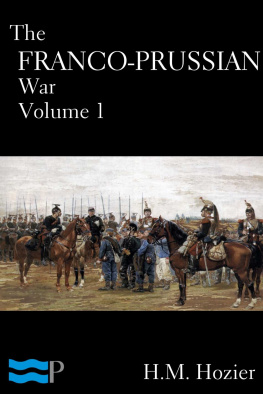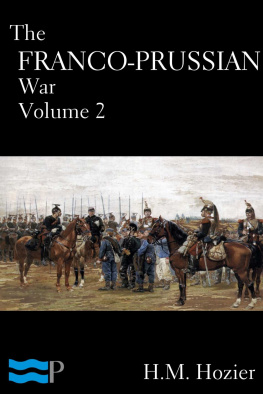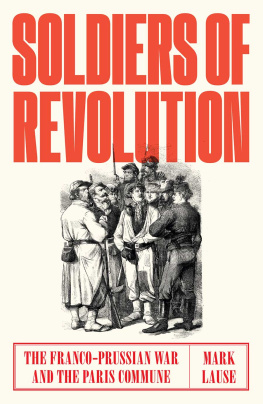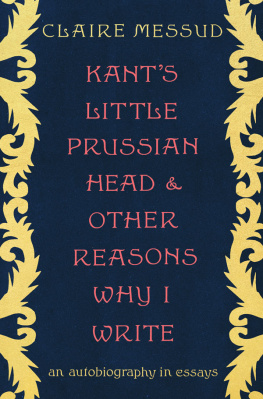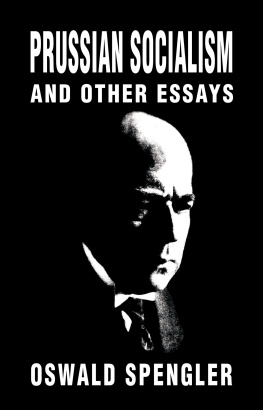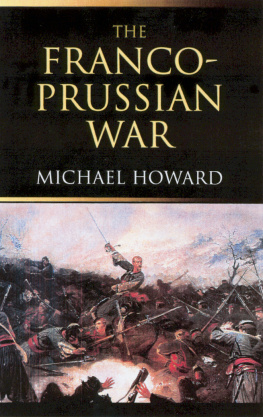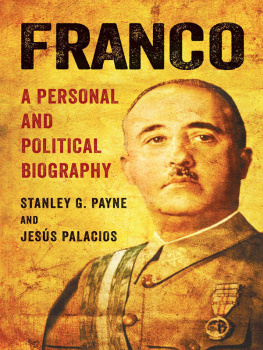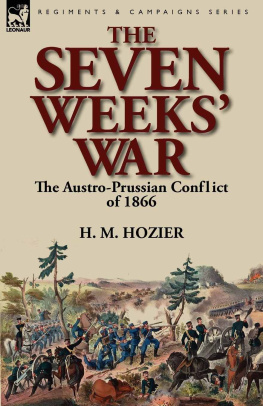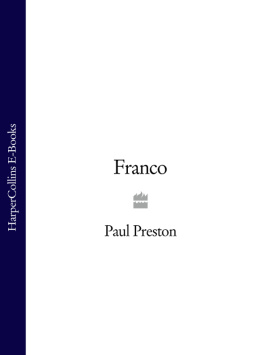H.M. Hozier - The Franco-Prussian War Volume 1
Here you can read online H.M. Hozier - The Franco-Prussian War Volume 1 full text of the book (entire story) in english for free. Download pdf and epub, get meaning, cover and reviews about this ebook. year: 2014, publisher: Pyrrhus Press, genre: Science. Description of the work, (preface) as well as reviews are available. Best literature library LitArk.com created for fans of good reading and offers a wide selection of genres:
Romance novel
Science fiction
Adventure
Detective
Science
History
Home and family
Prose
Art
Politics
Computer
Non-fiction
Religion
Business
Children
Humor
Choose a favorite category and find really read worthwhile books. Enjoy immersion in the world of imagination, feel the emotions of the characters or learn something new for yourself, make an fascinating discovery.
The Franco-Prussian War Volume 1: summary, description and annotation
We offer to read an annotation, description, summary or preface (depends on what the author of the book "The Franco-Prussian War Volume 1" wrote himself). If you haven't found the necessary information about the book — write in the comments, we will try to find it.
The Franco-Prussian War Volume 1 — read online for free the complete book (whole text) full work
Below is the text of the book, divided by pages. System saving the place of the last page read, allows you to conveniently read the book "The Franco-Prussian War Volume 1" online for free, without having to search again every time where you left off. Put a bookmark, and you can go to the page where you finished reading at any time.
Font size:
Interval:
Bookmark:
H.M. Hozier
Pyrrhus Press specializes in bringing books long out of date back to life, allowing todays readers access to yesterdays treasures.
H.M. Hozier wrote one of the most comprehensive histories of the seminal Franco-Prussian War, the late 19th century conflict that helped give rise to the modern nation of Germany. In Volume 1, Hozier covers the causes of the war up until around the battle of Sedan, the climactic clash that determined the fate of the war in 1870.
Posterity will judge far more easily and accurately than the present generation possibly can, the relation of cause and effect, in the series of events culminating this year, 1870, in the tremendous struggle of nations on the banks of the Rhine. After the lapse of ages, the occurrences of a century are narrated in a few pregnant sentences, stating what was the germ, growth, and culmination of one or two fecund ideas, one or two national aspirations. The present decade, so memorable in Prussian history, commenced a hundred years after the triumphs of Frederic the Great in the Seven Years War (1756-63). That far-off indication of Prussias military power marked her as the leader of Germany, and the humiliations she endured at the hands of the first Napoleon served only to intensify in her a disposition to restore the German race to the honour and dignity which is its due. On the other hand, the revolutionary ideas which in France and neighbouring states produced astounding results, both for good and evil, eighty years ago, re-appeared in great force in the European uprisings of 1848. Again the French people, after a vain effort at self-government and liberty of action, yielded to the despotic sway of personal government, while the Germans strove for national unity with a national Parliament, also in vain. Yet the patient Germanic spirit, abiding its time, looked forward hopefully and eagerly to the day when unity should endow the nation with commanding strength. To accomplish this great end many sacrifices were necessary, and much boldness, both civil and political, in the leaders. Above all, the elimination of foreign and heterogeneous elements from the national life was essential. France under the second Empire, as the child of Revolution, had raised the cry of nationalities, and by a rude stroke at Austrian and papal power had brought about the unity of Italy. Germany, the seat of learning and of the highest civilisation, sighed at its own confederated impotence. There it lay, rich in all the elements of political greatness, but unable to combine them by reason of its division into petty principalities and dukedoms. The national aspirations pointed to the welding of these parts into one solid whole; but a great leader was wanting to give form and vitality to these aspirations. At length came the hour and the man. Count von Bismarck was made prime minister and minister for foreign affairs to the king of Prussia. He had deeply pondered all the intricate problems which the state of Germany presented. With profound insight he saw the causes of national weakness and laboured assiduously to remove them. With his one object in view, and with little tenderness for other courts or other princes, he began his great task at the easiest end, by despoiling the Danish crown of its German appanages. After a brief pause, he proceeded to get rid, as far as possible, of the non-German elements existing in the Austrian empire, and by a reconstruction of the German Confederation excluded that Slavonic and Hungarian compound of peoples from Germany proper. His wonderful success in these great achievements waited but the crowning step of a close federal union with the states of South Germany, when the emperor of the French, goaded by the jealous murmurs of his people, who can bear no rival near the throne of their supremacy, rushed into a war that seems destined to complete all Count Bismarcks designs, and make Germany the chief military power of Europe.
Of this general outline a few explanatory details will be necessary. The grand product of the Revolutionary and Napoleonic wars which ended in 1814 was that celebrated instrument, the Treaty of Vienna. Such at least it seemed in the eyes of men who do not observe the under-currents of history. It has been the vain boast of the admirers of this document that it preserved the peace of Europe for forty years; it had in truth very little to do with preserving the peace of Europe, and unquestionably it failed to secure the observance of its own provisions for even half that time. Even while the plenipotentiaries were seated round the Congress table, an ominous interruption compelled them to throw down their protocols and provisos, and hasten to their respective courts. The great disturber of the equilibrium which the Congress was attempting to restore had broken loose from Elba. His name once more inflamed the martial ardour of France, and he cast his last bloody die for empire on the field of Waterloo, forfeiting for ever his liberty and crown. The Congress was resumedthe Treaty solemnly signed and ratified. Its leading provision, in accordance with the ostensible purpose of the allied powers in making war against the usurper, was that the elder branch of the Bourbons should reign over France. This arrangement made no allowance for the vast change wrought in the French people, morally, intellectually, and socially, by the Revolution; and after a painful duration of fifteen years it crumbled into dust before the three July days of revolution in 1830.
Font size:
Interval:
Bookmark:
Similar books «The Franco-Prussian War Volume 1»
Look at similar books to The Franco-Prussian War Volume 1. We have selected literature similar in name and meaning in the hope of providing readers with more options to find new, interesting, not yet read works.
Discussion, reviews of the book The Franco-Prussian War Volume 1 and just readers' own opinions. Leave your comments, write what you think about the work, its meaning or the main characters. Specify what exactly you liked and what you didn't like, and why you think so.

